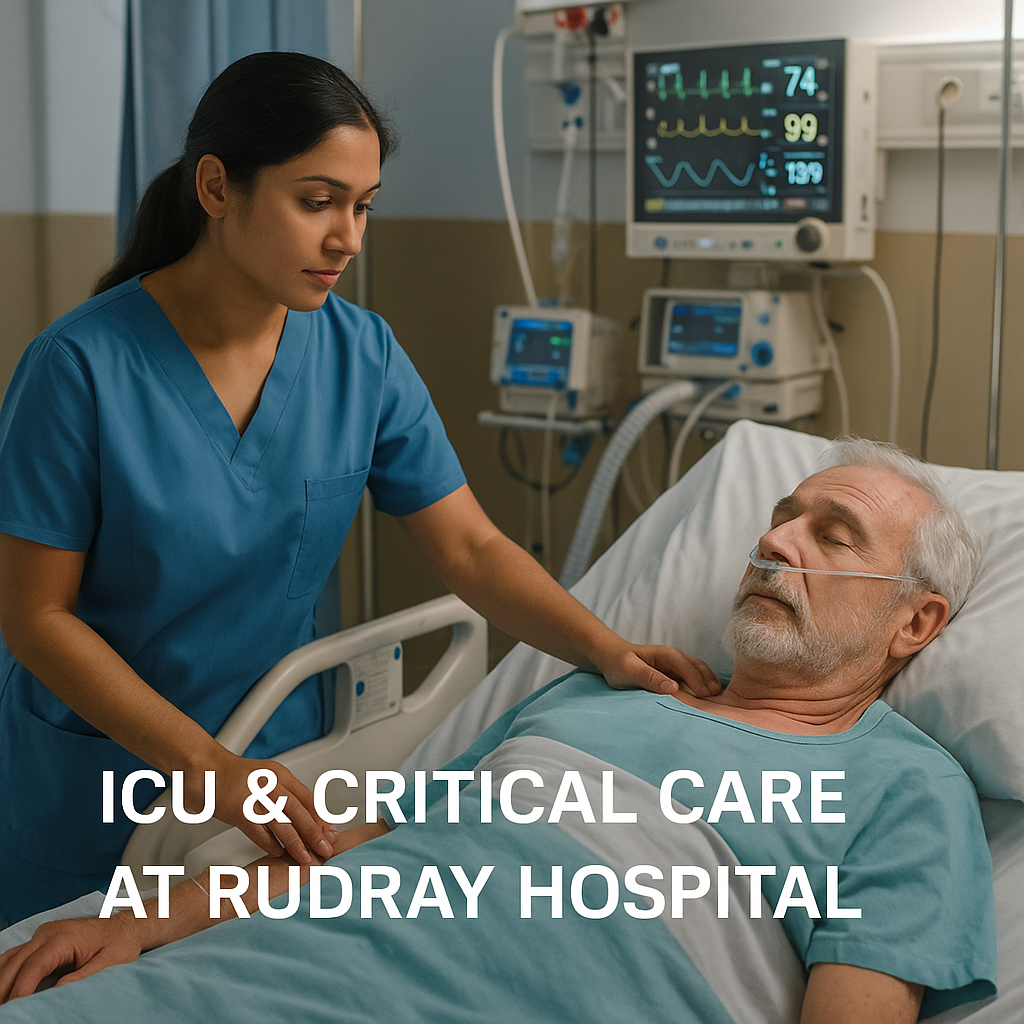
ICU & Critical Care at Rudray Hospital, Nikol, Ahmedabad
The Intensive Care Unit (ICU) and Critical Care Department at Rudray Hospital, Nikol, Ahmedabad, is dedicated to delivering life-saving treatment to patients who are critically ill or medically unstable. We offer 24x7 care for patients who require constant monitoring, advanced life support, and rapid medical intervention. Our ICU is equipped with the latest medical technology and managed by a team of highly trained intensivists, critical care nurses, anesthesiologists, respiratory therapists, and support staff.
What is Critical Care?
Critical care, also known as intensive care, is specialized medical treatment provided to patients with life-threatening conditions that require comprehensive and continuous monitoring. These patients may have suffered from severe trauma, cardiac or respiratory failure, sepsis, stroke, organ failure, or post-surgical complications.
State-of-the-Art ICU Infrastructure
Our Intensive Care Unit is a sterile, controlled environment that is designed to support healing and manage acute conditions. The ICU at Rudray Hospital includes:
- Advanced multiparameter monitors for real-time vital signs
- High-end ventilators and respiratory support systems
- Central oxygen and suction systems
- Portable X-ray and ultrasound machines
- Bedside dialysis units
- Defibrillators and cardiac monitors
- 24x7 lab and diagnostic backup
- Isolation units for infectious patients
Types of Critical Care We Provide
- Medical ICU (MICU): For patients with conditions like respiratory failure, sepsis, kidney failure, or poisoning.
- Surgical ICU (SICU): Post-operative care for high-risk surgeries or complications during surgery.
- Cardiac ICU (CICU): For patients with severe heart conditions like heart attack, arrhythmia, or cardiac arrest.
- Neuro ICU: Stroke, head injury, brain hemorrhage, and post-neurosurgery care.
- Trauma ICU: Multi-system trauma patients following accidents, falls, or violence.
- Pediatric ICU: Critical care for infants and children (with coordination from pediatricians).
Conditions Managed in the ICU
- Cardiac arrest and acute myocardial infarction (heart attack)
- Sepsis and septic shock
- Stroke (ischemic and hemorrhagic)
- Acute respiratory distress syndrome (ARDS)
- Pulmonary embolism
- Severe trauma and polytrauma
- Post-operative complications
- Kidney or liver failure
- Drug overdose or poisoning
- Coma and unconscious states
Expert Critical Care Team
At Rudray Hospital, our ICU is led by full-time intensivists — doctors specialized in intensive care medicine. The team includes:
- Critical care physicians (intensivists): In charge of ICU treatment plans and emergencies
- Specialist consultants: Cardiologists, pulmonologists, neurologists, nephrologists, etc.
- ICU-trained nurses: For close monitoring and nursing support
- Respiratory therapists: Managing ventilator support and airway care
- Anesthetists: For sedation, airway management, and pain control
Technology in the ICU
Technology plays a vital role in critical care. Rudray Hospital has invested in the latest innovations:
- Continuous cardiac telemetry for arrhythmia detection
- High-flow nasal cannula (HFNC) for oxygen therapy
- Non-invasive ventilation (BiPAP, CPAP)
- Video laryngoscopes for difficult airway intubation
- Point-of-care testing (ABG, lactate, electrolytes)
- Central monitoring station for remote patient tracking
Emergency & Triage System
Our Emergency Department has a fast triage system that identifies patients who need ICU care at the earliest. Patients are stabilized and transferred immediately with the help of our ambulance and critical care transport team.
Post-ICU Rehabilitation & Step-Down Units
Once patients improve, they are shifted to High Dependency Units (HDU) or step-down care rooms. This ensures continued recovery under close supervision while freeing ICU beds for others in need.
Family Counseling & Communication
We understand that ICU treatment can be emotionally taxing for families. Our team provides daily updates, compassionate counseling, and involvement in decision-making. We also support families with:
- ICU visiting hours and guidelines
- Financial and insurance assistance
- Palliative care options for end-of-life situations
ICU Protocols & Safety Standards
Our ICU follows internationally accepted protocols and NABH guidelines to ensure patient safety:
- Infection control practices (hand hygiene, PPE, sterile techniques)
- Daily ICU rounds by multidisciplinary teams
- Early weaning from ventilators
- Minimal use of invasive devices when possible
- Strict antibiotic stewardship
Multispecialty ICU Coordination
Complex ICU cases require a team-based approach. Rudray Hospital has seamless coordination between ICU doctors and other departments:
- Cardiology for cardiac arrests and arrhythmias
- Neurology for stroke and seizures
- Nephrology for dialysis and kidney failure
- Pulmonology for respiratory failure and ARDS
- Gastroenterology for liver disease and GI bleeds
When Does a Patient Need ICU Admission?
- When vital signs (heart rate, BP, oxygen) are unstable
- After major surgery requiring continuous monitoring
- When ventilator support is needed for breathing
- In cases of severe infection or blood poisoning
- Uncontrolled bleeding or trauma
Patient Rights & Dignity
At Rudray Hospital, we prioritize the dignity, comfort, and ethical treatment of all critically ill patients. We support patient rights, ensure privacy, and maintain confidentiality at every step.
Insurance & ICU Billing Support
Our administrative staff helps families understand ICU billing, insurance coverage, pre-authorization, and claim settlement. We accept all major cashless mediclaim and TPAs.
Why Choose Rudray Hospital for Critical Care?
- Round-the-clock specialist ICU care
- Infection-controlled and technology-driven ICU setup
- Ethical, transparent communication with families
- Proven success in handling complex cases
- Emergency ambulance and ICU on wheels support
- Holistic patient recovery support post-ICU